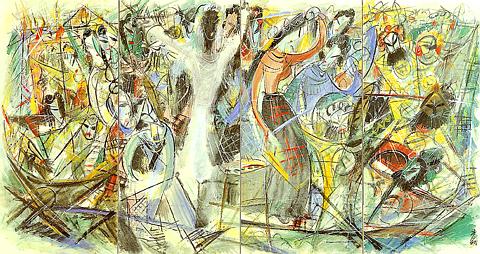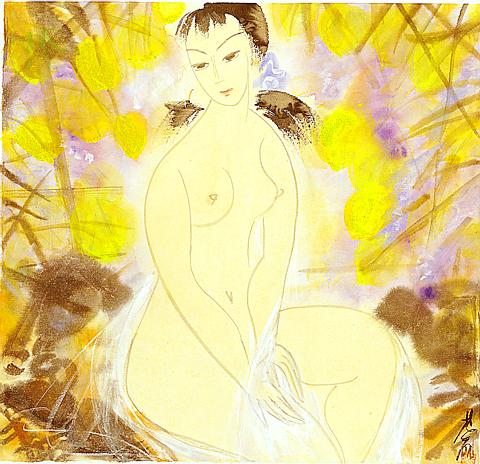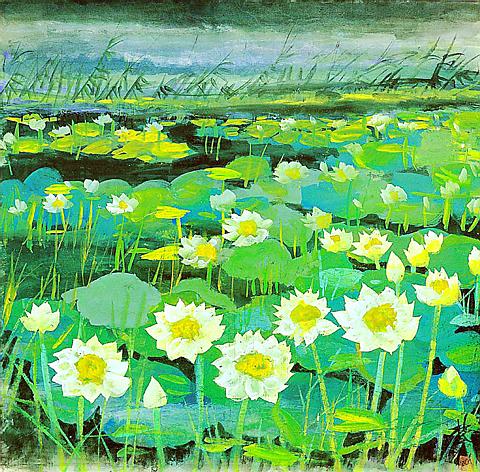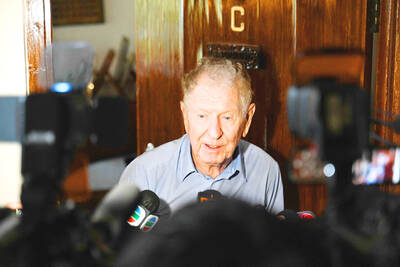Lin Feng-mian (林風眠) earned his reputation as a prominent Chinese artist not only for his extraordinary painting techniques, but also for his endeavor to create a unique Chinese artform by integrating the essence of the occidental art with traditional Chinese culture, according to Ho Huai-shuo (何懷碩), a celebrated Taiwanese painter and professor at the National Institute of the Arts.
“Among the host of contemporary Chinese painters, Lin was one of the very few who understood that the most exquisite art pieces cannot be achieved by pure imitation — rather, they were created by absorbing the quintessence of alien cultures with an aim of producing paintings rich in national spirits,” Ho said while attending the opening ceremony of of an exhibition of Lin's work at Taipei's Sun Yat-sen Memorial Hall.
“Tradition is frequently seen as an obstacle to progress. Nevertheless, Lin was aware that the most valuable works of art should retain the unique characteristics of their creators's influences — neither completely forsaking Chinese tradition nor fully embracing the western style.”

PHOTO: COURTESY OF THE SUN YAT-SEN MEMORIAL HALL
“For his entire life, Lin committed himself to instilling the marrow of western artforms into Chinese painting. He has established an exquisite avenue to link the conventional with the fashionable via Chinese folk art. And that's what makes Lin such an influential figure in Chinese art history,” Ho said.
Yesterday marked the first day of a special exposition featuring a total of 68 of Lin's paintings. The exhibition, commemorating what would be Lin's 100th birthday, is co-sponsored by the Sun Yat-sen Memorial Hall, the
Lin, born in 1900 in China's Guangdong Province, sailed to Marseille in France in 1920 to study in what was seen as the undisputed center of the art education world at the time.

During his six-years in France, he was exposed to the most vibrant artistic surroundings and was captivated by the dominant artistic genres of the era — including cubism, expressionism and Fauvism.
Lin returned to China in 1926, embarking on a personal crusade to better arts education in his homeland — an endeavor which would last until his dieing days.
During the Cultural Revolution, he was tortured by the Chinese authorities and was jailed from 1969 to 1971.

PHOTO: COURTESY OF THE SUN YAT-SEN MEMORIAL HALL
Subsequently, he spent much of his time travelling the world painting and exhibiting his works.
He passed away in 1991 in Hong Kong at the age of 92.
Hsi The-chin (席德進), Chao Wu-chi (趙無極), and Chu Teh-chun (朱德群) are among the well-known Chinese artists influenced greatly by Lin.
His god-daughter Feng yeh (馮葉) — who lived with Lin for 30 years and studied under him — told the
“He cared a great deal for the people and his country, and he was not intimidated by the dictatorial regime. His emotion and his love were clearly portrayed in his works.”
“He considered safeguarding Chinese art as his mission in life. He told me on one occasion that a good artist should not be selfish, instead, they should be compassionate. A good artist should not be concerned about personal wealth or fame, but should always put the interests of others first,” Feng said.
Professor Ho echoed Feng's words, saying that Lin's value to Chinese society was not limited to his artistic achievements, it hinged more on his love for human beings, his sympathy for people's ordeals, and his stand against injustice and abusive authorities.
The exhibition will run until Aug. 28. Those interested telephone 02-2763-0535 for more details.

MORE VISITORS: The Tourism Administration said that it is seeing positive prospects in its efforts to expand the tourism market in North America and Europe Taiwan has been ranked as the cheapest place in the world to travel to this year, based on a list recommended by NerdWallet. The San Francisco-based personal finance company said that Taiwan topped the list of 16 nations it chose for budget travelers because US tourists do not need visas and travelers can easily have a good meal for less than US$10. A bus ride in Taipei costs just under US$0.50, while subway rides start at US$0.60, the firm said, adding that public transportation in Taiwan is easy to navigate. The firm also called Taiwan a “food lover’s paradise,” citing inexpensive breakfast stalls

US PUBLICATION: The results indicated a change in attitude after a 2023 survey showed 55 percent supported full-scale war to achieve unification, the report said More than half of Chinese were against the use of force to unify with Taiwan under any circumstances, a survey conducted by the Atlanta, Georgia-based Carter Center and Emory University found. The survey results, which were released on Wednesday in a report titled “Sovereignty, Security, & US-China Relations: Chinese Public Opinion,” showed that 55.1 percent of respondents agreed or somewhat agreed that “the Taiwan problem should not be resolved using force under any circumstances,” while 24.5 percent “strongly” or “somewhat” disagreed with the statement. The results indicated a change in attitude after a survey published in “Assessing Public Support for (Non)Peaceful Unification

The CIA has a message for Chinese government officials worried about their place in Chinese President Xi Jinping’s (習近平) government: Come work with us. The agency released two Mandarin-language videos on social media on Thursday inviting disgruntled officials to contact the CIA. The recruitment videos posted on YouTube and X racked up more than 5 million views combined in their first day. The outreach comes as CIA Director John Ratcliffe has vowed to boost the agency’s use of intelligence from human sources and its focus on China, which has recently targeted US officials with its own espionage operations. The videos are “aimed at

Four former Hong Kong opposition lawmakers jailed in the territory’s largest national security case were released yesterday after more than four years in prison, the first among dozens convicted last year to regain their freedom. Former legislators Claudia Mo (毛孟靜), Jeremy Tam (譚文豪), Kwok Ka-ki (郭家麒) and Gary Fan (范國威) were part of a group of 47 public figures — including some of Hong Kong’s best-known democracy advocates — who were charged with subversion in 2021 for holding an informal primary election. The case fell under a National Security Law imposed on the territory by Beijng, and drew international condemnation and warnings